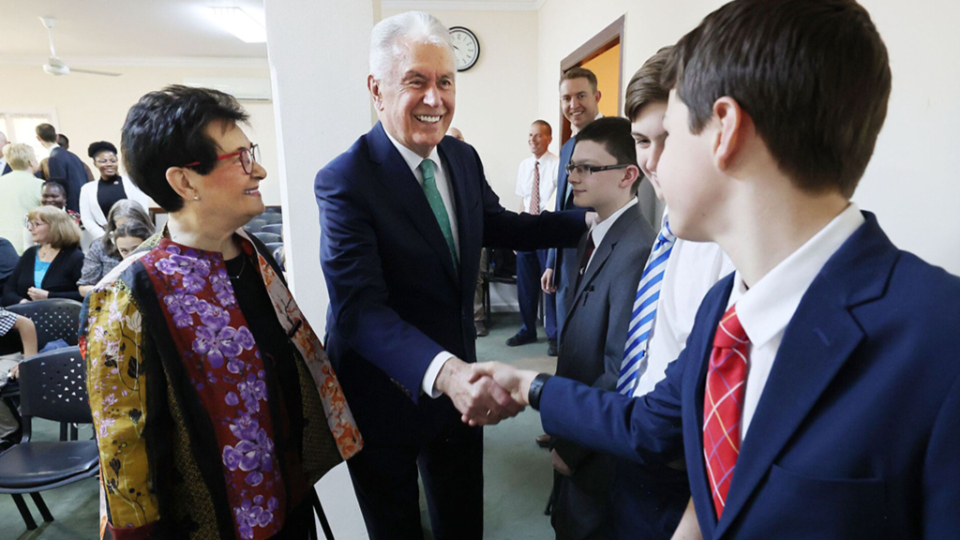
Uchtdorf-Egypt-2023
Elder Dieter F. Uchtdorf of the Quorum of the Twelve Apostles and his wife, Sister Harriet Uchtdorf, greet young men prior to a two-branch sacrament meeting in Cairo, Egypt, on Friday, April 14, 2023. Photo by Jeffrey D. Allred, courtesy of Church News.Copyright 2023 Deseret News Publishing Company.
This story appears here courtesy of TheChurchNews.com. It is not for use by other media.
By Scott Taylor, Church News
CAIRO, Egypt
The Friday morning sacrament meeting begins in the rented villa nested among apartment buildings and residences in Maadi, a suburb of tree-lined streets in Cairo, which itself is bisected by the Nile River and flanked by seemingly never-ending sand and deserts. The unmistakable melody of “I Am A Child of God,” the opening hymn, is sung in both English and Arabic languages.
With an Africa-largest metro area of more than 20 million people having risen from the cradle of an ancient kingdom and where a once-ancient skyline of towering pyramids is now joined by minarets, mosques, castles and tall modern buildings, a small gathering of Latter-day Saints a little more than 100 strong sits quietly, listening to the teaching teachings and testimonies of a modern-day Apostle.
And despite what could have been seen as a series of twists and contrasts regarding the day, languages, setting and circumstances, Elder Dieter F. Uchtdorf of the Quorum of the Twelve Apostles said the April 14 combined sacrament meeting members of the Cairo Branch (English) and Nile River Branch (Arabic) was evidence of “the universal gospel of Jesus Christ and the global Church of Jesus Christ of Latter-day Saints.”
- Uchtdorf-Egypt-2023
- Uchtdorf-Egypt-2023
- Uchtdorf-Egypt-2023
- Uchtdorf-Egypt-2023
- Uchtdorf-Egypt-2023
- Uchtdorf-Egypt-2023
- Uchtdorf-Egypt-2023
- Uchtdorf-Egypt-2023
- Uchtdorf-Egypt-2023
- Uchtdorf-Egypt-2023
- Uchtdorf-Egypt-2023
- Uchtdorf-Egypt-2023
| Temple Square is always beautiful in the springtime. Gardeners work to prepare the ground for General Conference. © 2012 Intellectual Reserve, Inc. All rights reserved. | 1 / 2 |
‘It Unites Us as a Community’
Noting that the meeting’s sacrament prayers had been offered in Arabic, Elder Uchtdorf said, “We all knew what it meant. We let the Spirit guide us — the Spirit will guide us to understand, to feel and then to act.”
He also underscored how the sacrament ordinance can be a uniting experience, despite differences. “The sacrament is one of those things where we unite ourselves as a community of Saints,” he said, adding that most ordinances are done as individuals — baptism, baby blessing, temple ordinances, all by name.
“But the sacrament — it is all of us, and it unites us as a community. It’s one of the reasons we love to come together — to participate in the sacrament and be reminded of the Savior, who is the Center of it all,” he said, emphasizing to branch members that “Jesus Christ is your strength.”
Sister Harriet Uchtdorf joined Cairo Egypt District President Mark R. Spencer and Nile River Branch President Marcous Baher as the meeting’s other speakers, with Sister Uchtdorf saying that she was making her first visit to Egypt.
Acknowledging Cairo’s historical trove of treasured antiquities, she then spoke of her own conversion to the gospel and her enduring collection of “eternal treasures,” including the knowledge of the plan of salvation, the inspiration from the Holy Spirit, and the needed guidance from latter-day prophets and apostles.
After the meeting, branch members met with Elder and Sister Uchtdorf outside in the courtyard behind the villa for personal greetings, a light meal and a group photo.
Said Blessing Yahana, a native of Nigeria now living in Cairo, “It was like a dream come true. I’ve always wanted to meet an Apostle — yes, it’s my first time to meet an Apostle and to have a handshake with him.”
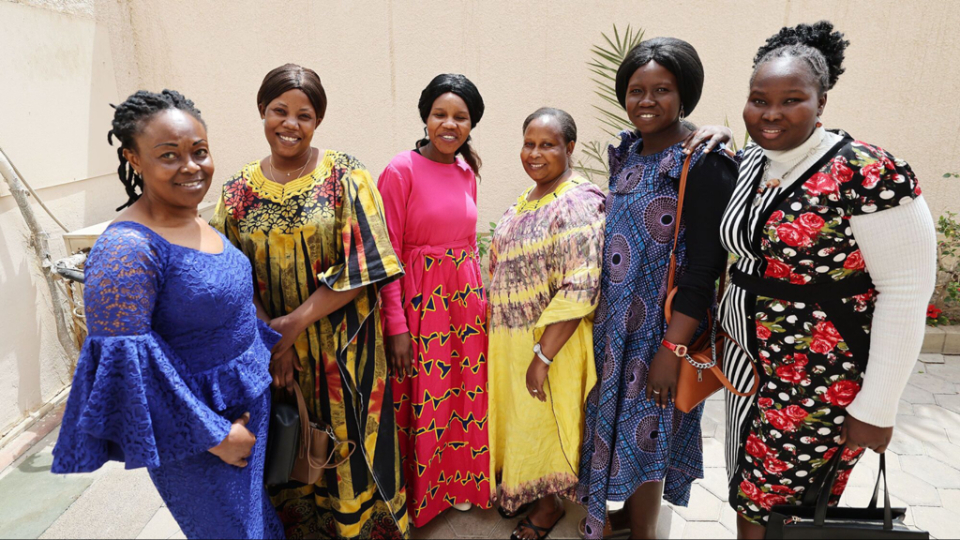
Uchtdorf-Egypt-2023
Cairo Latter-day Saints attend a two-branch sacrament meeting in Cairo, Egypt, on Friday, April 14, 2023. Photo by Jeffrey D. Allred, courtesy of Church News.Copyright 2023 Deseret News Publishing Company.
The Branch’s Beginnings in 1974
The Cairo Branch is the Church’s longest continually operating unit in the Middle East, said President Nathaniel A. Ayer, with the branch president noting that some area branches may have been created earlier but also had some interruptions at some point.
The branch was organized in 1974, when two students who arrived in Cairo for intensive study of Arabic, Dilworth B. Parkinson and John Sharp, got together with Carol Azeltine, a teacher at an international school in suburban Digla, and began holding Latter-day Saint services in the garden area of the American university in downtown Cairo. Later, individuals and families moved to teach, to work for oil companies and such, meeting in each other’s apartments in Maadi and then, beginning in 1981, in a leased villa.
The current two-story, air-conditioned villa in Maadi has been used since late 1992. And Latter-day Saint meetings in Cairo are held on Fridays, considered by Muslims to be the national holy day of the week, just like shabbat — the Jewish day of rest — is observed in Israel.Averaging a weekly attendance of 40-plus, the branch today is comprised mostly of Latter-day Saint individuals and families who have come to Cairo because of employment in the international diplomatic community or in the educational systems supporting those families, said President Ayer, who runs a U.S. business remotely and is in Cairo with his wife, Hilary, and four children.
The Cairo Branch hosts a Zoom video conference of its Friday meetings for members residing elsewhere in Egypt, into Algeria and beyond. “Some of these families are spread so far and wide that they don’t have other youth or members in the cities where they live,” President Ayer said.
Government restrictions preclude the branch from advertising its presence, “but members of the Church are welcome to join us,” he added, referring to travelers and tourists who might be interested in attending — and are aware of the Friday morning meeting schedule.
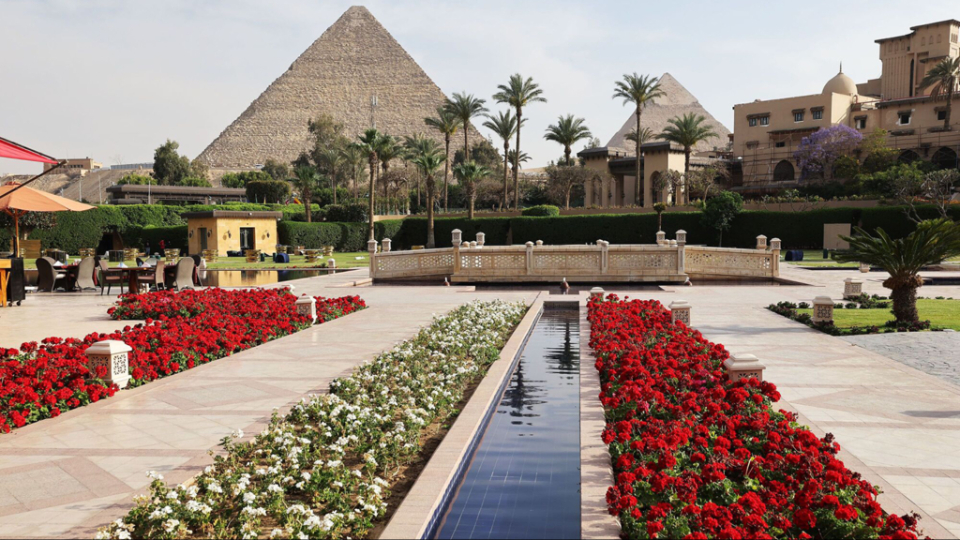
Uchtdorf-Egypt-2023
The pyramids of Giza in Cairo, Egypt, on Friday, April 14, 2023. Photo by Jeffrey D. Allred, courtesy of Church News.Copyright 2023 Deseret News Publishing Company.
‘The Branch Is My Lifeline’
At age 71, Phyllis Jensen Ali is not only the branch’s oldest member but longest attending one as well, having started in 1984 when she moved with her Egyptian husband and three children under the age of 4 to Cairo so the children could learn Arabic and they could be close to her husband’s family. After her husband began work, she started teaching at an American school and found Cairo to be “a wonderful place to raise children.”
Other than her family’s return to the United States for several years in the 1990s, Ali has been a mainstay at the Cairo Branch, remembering a smaller villa for a meetinghouse and missionary couples that previously led the branch during her four decades in Egypt. “The branch has been my lifeline, she said, recalling apostolic visits from Elder David A. Bednar of the Twelve about four years ago and Elder Jeffrey R. Holland of the Quorum of the Twelve and President Boyd K. Packer, the late President of the Twelve, before that.
“Other members need to understand that the Church in Cairo is the same wherever you go,” Ali said. “We still do the same things — it’s a very close-knit branch, and we’re really like family. When someone doesn’t come to church, you’re looking around and thinking, ‘I’ve got to call him or her and see what’s happening.’ We really take care of each other. And when anyone moves in, we’re right there with them and helping.”
Noting that her husband is not a member, Ali said: “He goes to the mosque, I come to church, and we meet at home.”
Ali and fellow branch member Robyn Larsen were among the first to arrive early Friday and wait for the Uchtdorfs’ arrival.
Larsen is in her third year of teaching at Schultz American School in Alexandria, more than 210 kilometers away (130 miles) on Egypt’s north coast. Attending worship services means Larsen faces a train trip or a hired-driver ride of two to three hours each way.
“We have some really great members between both branches,” said Larsen, adding that they keep in contact through WhatsApp. “For me, who is someone far away, it’s still nice to have that connection — I know I’ve got friends and people down here I can rely on.”
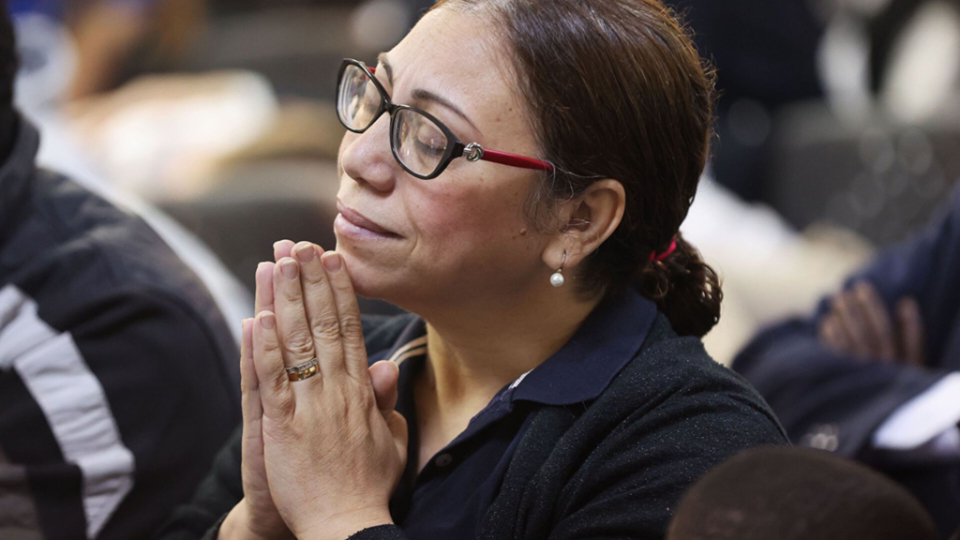
Uchtdorf-Egypt-2023
Mariam Hanna listens during a Cairo branch sacrament meeting in Cairo, Egypt, on Friday, April 14, 2023. Photo by Jeffrey D. Allred, courtesy of Church News.Copyright 2023 Deseret News Publishing Company.
‘The Church in Cairo Is Growing’
The Cairo Egypt District spans all of North Africa, from Morocco across to Egypt and down to Sudan and includes a branch each in Morocco and Tunisia and the two Cairo branches, said President Spencer, acknowledging the scattered members in Alexandria, Algeria and Sudan who join the Cairo meetings via Zoom.
And the district includes English speakers; French-speaking West Africans in Tunisia; and Arabic speakers in Morocco, South Sudan and among the Egyptian Christians, said President Spencer, who with his wife teaches school where their children also attend.
When visiting the United States recently, he gave a distance comparison of the district to friends there, likening the span of from Cairo to Casablanca, Morocco, to that from New York City, New York, to San Francisco, California. “That’s all the way across the United States — so that helped them to get an idea of just how big the district area is.”
The Spencers lived in Cairo previously, from 2006 to 2008, before returning several years ago. “It’s important that the members know that the Church in Cairo is growing,” said President Spencer, having witnessed the differences from their first stay to today, including the addition of the Arabic branch several years ago.
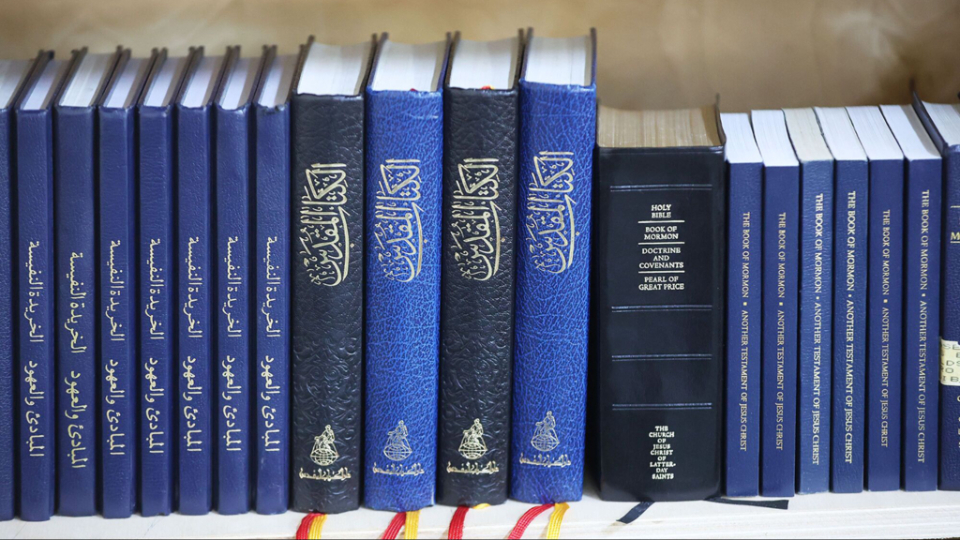
Uchtdorf-Egypt-2023
Scriptures at a Cairo meetinghouse in Cairo, Egypt, on Friday, April 14, 2023. Photo by Jeffrey D. Allred, courtesy of Church News.Copyright 2023 Deseret News Publishing Company.
‘A Member of This Family’
President Baher of the Nile River Branch converted to the Latter-day Saint faith five years ago, about the time local district and branch leaders started seriously considering the formation of an Arabic-speaking unit. Branch membership includes Latter-day Saints who are refugees from South Sudan and other Arabic-speaking areas, as well as Egyptian Christian converts.
“I could talk hours and days in telling you about what has happened and what kind of miracles and amazing things have happened in this last five years and in the Nile River Branch,” he said. “But let me tell you in one small sentence — now we have a small family of God’s children in Egypt that consists of Egyptian and Sudanese members and others, and it is a small part of the gathering of Israel. It is working in Egypt.”
Mina Sobhy is proof of that. The doctor who works in a local medical laboratory is a convert of several weeks. He attended Friday’s meetings, greeting members of the branches and visitors alike, excited to share his conversion and to connect on WhatsApp by sharing small notes and a message of “I’m so honored and blessed to meet you. God bless.”
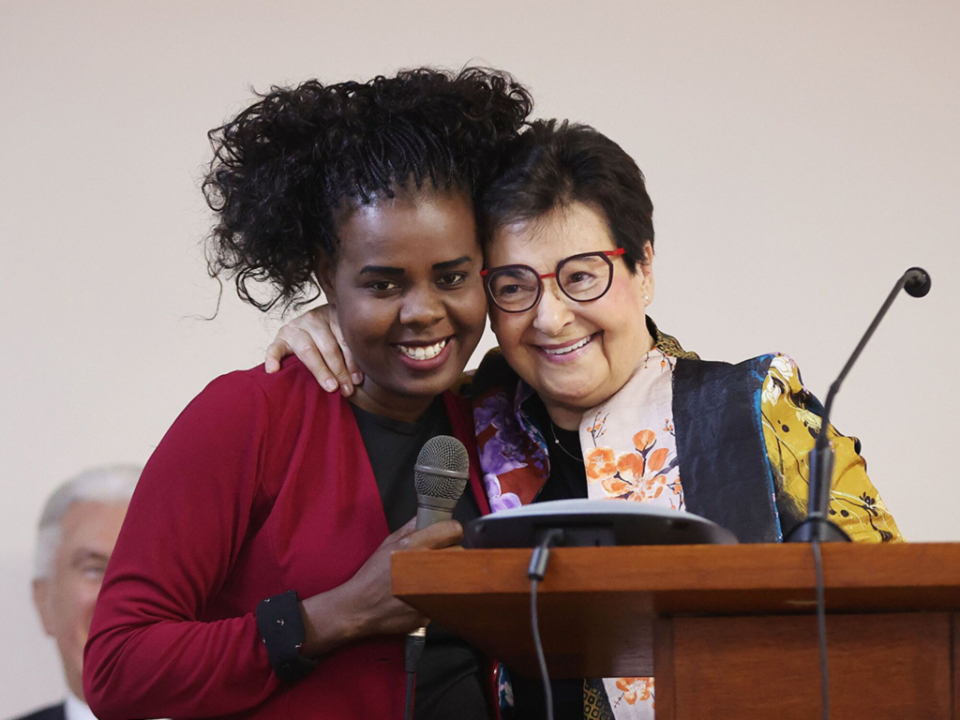
Uchtdorf-Egypt-2023
Sister Harriet Uchtdorf hugs her interpreter, Tina Fakir, while speaking at a two-branch sacrament meeting in Cairo, Egypt, on Friday, April 14, 2023. Photo by Jeffrey D. Allred, courtesy of Church News.Copyright 2023 Deseret News Publishing Company.
The branch president and Cairo native calls the Nile River Branch “a small, promising branch” of around 50 members. “I cannot say more than ‘Thanks to God for showing us a way and helping us to show our brothers and sisters a way.’”
Accompanied by the district president, President Baher recently traveled to receive his temple endowments in the Rome Italy Temple — and hopes for the same for other branch members. “As I think of this experience in the temple, I am filled with a similar desire for all members here in Egypt.
The local World Bank assistant director in Egypt and English tutor summarizes his five-year growth in the gospel: “It has been five years of happiness and peace and joy. I am so proud to be a member of this family.”
Copyright 2023 Deseret News Publishing Company.